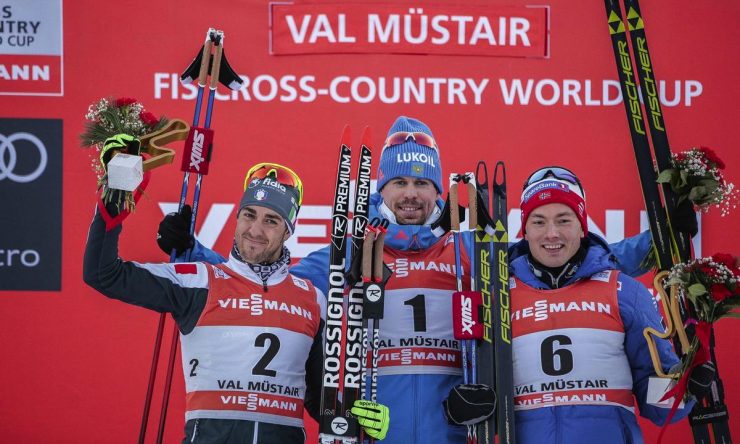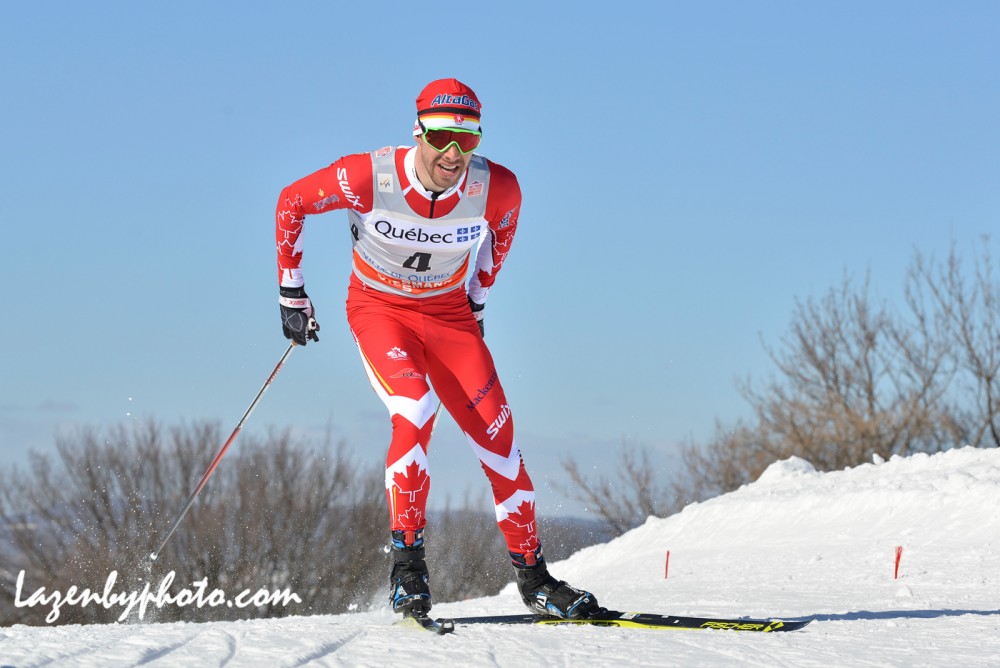
The 11th Tour de Ski began Saturday in Val Müstair, Switzerland, with a 1.5-kilometer freestyle sprint.
Nearly three minutes flat — 3:00.50 specifically — is all it took Russia’s Sergey Ustiugov in the sprint final to deliver his country a positive sporting distraction. As the fastest qualifier to start the day, Ustiugov ran the tables in the quarters and semis, too. Last season’s overall Sprint World Cup winner, Italian Federico Pellegrino placed second (+ 2.03), and Norway’s Finn Hågen Krogh finished third (+2.80).
According to an International Ski Federation (FIS) press release, the 24-year-old Ustiugov played it humble, knowing the Tour is a tour, not a one-off sprint.
“I did not feel unbeatable but I felt very strong today,” Ustiugov said. “It is good start the Tour with a victory. I will try to stay behind [Norway’s Martin Johnsrud] Sundby tomorrow.”
Sunday’s stage, the second of the seven-stage Tour, is a 10 k classic mass start and should be a frenzy of tactics and searing lungs, but more on that big picture in a bit.
“I am very happy to be the strongest today and to tell the truth I want to be the best during the Tour for myself and for all the guys who stayed at home,” Ustiugov said in a post-race interview with FIS, referring to his provisionally suspended teammates. “We were training together. We [are] all very strong, but I will do it, I will try.”
No podiums until today — that sums up the high standards for Pellegrino. Last season, when he won the sprint globe, the Italian made five sprint podiums, all victories. Before Saturday’s second place, three World Cup sprints into the 2016/2017 season, he’d placed 18th, 17th and seventh, respectively.
“I did not have a good start to the season,” Pellegrino said to FIS. “I have been looking for a good shape and good feeling on skis. I am lacking maximum speed at the moment. But second place today is a good sign. After the qualification I knew I could be fighting for second place.”
Krogh is another overall player in the Tour. During last year’s edition, he was second overall to Sundby. A podium in the sprint sets him up for the long haul.
“I am satisfied with third place,” Krogh told FIS. “The goal of the day for me was to get to the final and get as many bonus seconds as possible. It’s a big bonus to finish on the podium today. Sergey [Ustiugov] showed his strength again. In the second lap Sergey and I were fighting for the lead. But I was not strong enough, my legs were burning. But I am happy with third.”
For clarity, let’s stick with the sprint specialist. This includes U.S. Ski Team member Simi Hamilton.
“I think he has kicked it,” U.S. coach Matt Whitcomb said on the phone Saturday, referring to Hamilton’s lingering cold the first part of the World Cup season. “He has been looking really good the last few days. Very punchy, very responsive to speed changes, and he laid down a pretty fast qualifier today in 14th.”
Hamilton’s qualifying time of 3:09.19, put him just over four seconds off Pellegrino’s second fastest qualifying time; a positive trend.
“I was really struggling with sickness earlier this year, and I got hit really hard a couple of weeks ago … and I had to take basically ten days totally of from doing anything because I got hit so hard with that cold,” Hamilton explained on the phone. “And then it moved into my chest so I was pretty sick from that, but the Christmas training block went really well, and it felt like my energy came back fairly quickly, so I just focused on getting my speed back over Christmas.”
Val Müstair’s course is technical; a succession of rollers that looks like it’d be perfect for a charging kids’ league, fast check-your-speed hairpin turns, and a grinding climb.
“It’s definitely a really hard course here,” Hamilton said. “It’s quite hilly and long. It’s a super-fun course … so I think that that’s suits me well. But at the same time I think it plays into my weaknesses a little bit, in that on both the laps it a long, grindy climb, with a V1 kicker at the end. I think I tend to ski a lot better, and ski a lot more confidently on courses where I’m able to use the terrain more, more rolling courses where I can hammer and recover, hammer and recover.”
Hamilton finished 18th on the day after finishing fourth in his quarterfinal (+0.85) and said he plans on racing Sunday’s 10 k classic mass start. Afterward, he’ll withdraw from the Tour and get in some training before contesting an OPA Cup sprint along with teammates Sophie Caldwell, Ida Sargent, and Andy Newell next weekend in Planica, Slovenia.
Canadian World Cup Team member and sprint specialist Len Valjas qualified 21st and placed 16th overall. Valjas was eliminated after skiing to third in the second quarterfinal (+0.41).
A Sum of Its Parts
This version of the Tour de Ski features one sprint. And it’s over. Starting Sunday, the remaining six stages for the men feature a 10 k classic mass start, then a 20 k skiathlon, a 15 k skate pursuit, a 10 k skate, a 15 k classic mass start — and that killer 9 k Alpe Cermis climb in Val di Fiemme, Italy, to call it good.
As much as Saturday’s sprint was a high-speed spectacle, it was also an opportunity to methodically position oneself for the overall.
That brings up Sundby — a Tour stalwart. He’s a two-time winner of the Tour and just last year beat second-place finisher Krogh by 3:15.7 — the largest margin of victory ever in a Tour de Ski.
Like continuity? Then you’re in luck. Sundby placed fourth in the sprint (+3.52). Strong, tactically wily, able to string out and pop most hangers on in a tour — he’s won the last eight World Cup Tour events not including the 2015 Tour de Ski from which he was later disqualified for a doping violation — Sundby may have been off the podium on Saturday, but based on precedent, he’s still the skier to beat.
The day’s winner, Ustiugov, finished third in last year’s Tour (+3.43.8). Krogh and Ustiugov are set up to at least parry one another, if not try to topple Sundby. But in the Tour, every day isn’t exactly a new day — your results are cumulative and one bad day can haunt.

After the first stage, Canada’s Alex Harvey won’t be haunted. Harvey qualified 25th, but placed sixth overall.
Call it mustache-mojo, or whatever you want, the Canadian is well positioned; he’ll start Sunday’s Stage 2 with a 27.6-second deficit in the overall hunt. That beginning was better than expected when considering Harvey’s early sensations.
“Alex said he wasn’t feeling that great today, he was just tactically really strong, and he had it planned ahead,” Canadian World Cup coach Ivan Babikov on the phone.
“For the prologue I didn’t feel super good,” Harvey explained in a phone interview. “I had heavy legs, heavy breathing. I did my normal warmup, but my legs would get filled with lactate.”
Understanding his physical limitations for the day, the quick-to-fatigue legs, Harvey skied with more brains and less brawn.
“Every heat he executed perfectly, but he said he didn’t have very much pop, and wasn’t in super shape today,” Babikov noted. “This course is really hard, especially on the second lap, it’s people getting pretty lactated up. He saved most of his energy for the finish, and he kept out-sprinting people every time. He’s really strong, and he used what he had today, 200 percent. Bottom line, Alex made the final.”
Initially, it didn’t look like a slam dunk. In the early moments of his quarterfinal, it would have been easy to count Harvey out. He skied in sixth place. He looked poised to get dropped from the draft than advance to the semis.
Then Harvey moved. “I tried to position myself better, just be in a good position to attack the last hill,” Harvey said of his tactics. “That was good. I had my own line up the last hill, and I had enough jump and could gain a couple of spots there. And I had good cornering in the last downhill and went from fourth to third on the kind of speed bumps there and my final kick was really good.”
It was precise moves when it mattered most. Harvey won his quarterfinal. “I tried to do the same in the semi and it worked too,” Harvey said.
He advanced to the final with a second place in his semifinal.
In the final, Harvey noticed the heavy legs again and began to dial it back.
“Then at one point [in the final] spending a crazy amount of energy to maybe get fifth was kind of useless,” Harvey explained of his strategy. “I just skied to the line, but not kill myself to maybe get fifth because it’s two seconds more for bonus seconds. I’m still thinking of the big picture in the Tour so overall I am really happy because I made the most out of the situation.”
Devon Kershaw, Harvey’s Canadian teammate, was not satisfied with the day. He begins Sunday’s stage 1:14.6 back after placing 51st in the qualifier.
“Well, the thoughts are obviously those of disappointment with my performance today here in Val Mustair,” Kershaw wrote in an email. “I know that my old bones haven’t been the fastest on tour when it comes to Sprint Qualifiers these last 12 months — but here in Val Mustair the last two times we’ve been here I’ve been able to qualify top 20… So to be shelled and back in 51st is obviously a bit of a kick to the stomach…”
Kershaw, who turned 34 on Dec. 20, indicated he’s moving on, looking forward to the six stages of distance racing to come.
“So what’s done is done and now I shift the focus towards the longer races that suit my better,” he wrote. “I am really looking forward to a couple stages (tomorrow was one – but a 10km classic starting so far back on a twisty ribbon-of-snow 2.5 km loop will mean that it’ll be ‘busy’ out there on the tracks!) and I am feeling much better than in La Clusaz when I came down with a head cold.”
A mass start and not much real estate in terms of spreading the World Cup scrum out most likely means dicey skiing for the Tour’s second stage. “Tomorrow will be a very tight and probably a tad sketchy with so many bodies all wanting to be at the front and only 22-23 min to get it done — so I will want to keep my head up and make sure my horseshoe is under my bed tonight before I fall asleep,” Kershaw added.
Also for Canada, Graeme Killick finished 57th (+15.35) in the qualifier.
U.S. Ski Team (USST) member Erik Bjornsen finished 64th (+16.28), and teammate Noah Hoffman was 76th (+19.41).
Results: Sprint qualifier | Heats | Tour standings (through Stage 1)
Jason Albert
Jason lives in Bend, Ore., and can often be seen chasing his two boys around town. He’s a self-proclaimed audio geek. That all started back in the early 1990s when he convinced a naive public radio editor he should report a story from Alaska’s, Ruth Gorge. Now, Jason’s common companion is his field-recording gear.



